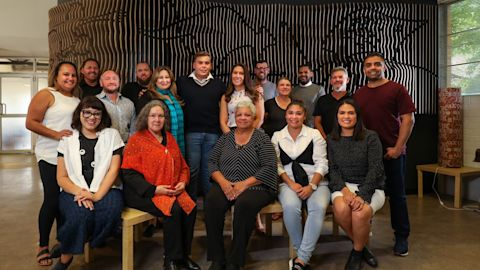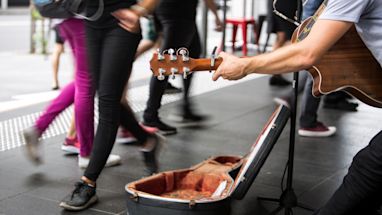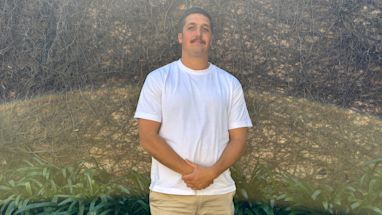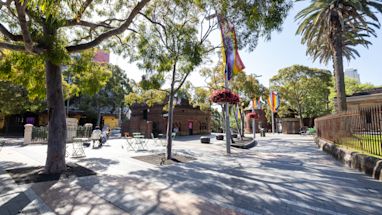Since 2008, the panel has provided advice to the City of Sydney on matters of importance to local Aboriginal and Torres Strait Islander communities.
There are up to 18 members who are appointed for up to 3 years. Nominations are open now until 17 November. You must live, work or study in the City of Sydney’s area to be eligible to nominate.
Jinny-Jane Smith is a Wiradjuri and Walbunja (Yuin nation) woman and co-chair of the current advisory panel. As she looks back at the end of her first term, she said there’s a lot to be proud of and encourages people to apply.

“Ensuring that Aboriginal people, content and culture is respected throughout the City of Sydney is one of the most positive things about being on the panel for me,” she said.
And she has seen real change during her term on the panel.
“I can see that Aboriginal people and culture has become more respected within the City of Sydney's vision.”
Panel members have provided advice on Sustainable Sydney 2030–2050 Continuing the Vision, Eora Journey projects and the reconciliation action plan.
The panel provides advice on matters of importance to local Aboriginal and Torres Strait Islander communities in the city, and City of Sydney policies, programs and events. It makes a positive contribution to the organisation’s relationship with the local Aboriginal and Torres Strait Islander community.
Young and old are invited to nominate
A broad range of perspectives from Aboriginal and Torres Strait Islander communities benefit the panel. The current panel has people in their 20s through to 60s with a range of experiences.
“There’s young and old and sports and the arts represented, and LGBTIQA+ community representation. We have activists. It’s a really diverse group,” panel member Tim Gray said.
Tim is a Gumbaynggir man now based in Sydney, an accomplished musician and public officer at Tribal Warrior. He is finishing up his second and final term on the panel.
He recommends anyone looking to nominate to keep an open mind.
“Go in with good intentions like wanting to help the community or to help the City of Sydney be a better council,” he said.
Seeing projects or initiatives discussed at the panel come to pass can take time he said, but it happens. He points to the Monument of the Eora, the artwork bara by Judy Watson on the harbour’s edge, as one of the things he was excited to see come to fruition in the 7 years he has been a panel member.
“I think sometimes people come into these panels and thinking that they can immediately change the world - and you can make change. But you also have to realise that change is within the confines of what the Council and local government can do. But you shouldn't be deterred by that!”

Jinny-Jane points to changes in the way grant applications are made and Aboriginal and Torres Strait Islander community organisations funded, as one example where the panel’s advice has made a big difference.
The City of Sydney introduced further support and accessible application formats to make applying easier. Aboriginal and Torres Strait Islander applicants, people with disability and people from culturally and linguistically diverse backgrounds, can now submit verbal grant applications.
“Before that, I know that a lot of the organisations within the local area were really struggling to be successful in obtaining City of Sydney grants.
“But now that has changed so much because of how it's been modified to actually assist mob," she said.
The new Aboriginal and Torres Strait Islander collaboration fund accepts applications year-round.
Making connections
Both Jinny-Jane and Tim said one of the most valuable things they have gained is the relationships with fellow panel members.
“When I joined, there were some people that I knew on there. But also people that I got to know. Being able to work with fellow community members on the panel and achieve things with those guys has been amazing,” Tim said.
Another key benefit of panel participation is gaining more of an understanding of the roles and responsibilities of local government compared to state government – and how you can have influence.
“The good thing about councils is that they are more grassroots that other governments are. So that is often appealing to people, particularly from the Indigenous community,” Tim said.
Jinny-Jane previously worked for the City of Sydney and also has legal services experience, but she acknowledges a lot of the general public don’t have that exposure.
“It’s helpful to have that knowledge, to learn how governance structures exist in local government. Being on the panel gives you a different perspective and better understanding for mob.”
If Jinny-Jane had any advice to anyone thinking of nominating to be on the panel, it would be to go ahead and do it:
“Be a part of the change. Stop talking about it and be about it.”
Nominations for the panel close at 5pm on Thursday 17 November.
Published 8 November 2022



